
 Published on and written by Cyril Jarnias
Published on and written by Cyril Jarnias
Dubai, the jewel of the United Arab Emirates, has established itself as one of the most sought-after destinations for entrepreneurs worldwide. With its dynamic economy, cutting-edge infrastructure, and attractive tax environment, the city offers fertile ground for business creation and development. Whether you’re an experienced entrepreneur or a novice in the business world, Dubai presents unique opportunities to realize your entrepreneurial ambitions. In this article, we’ll explore in detail the essential aspects of setting up a company in Dubai, from benefits to procedures, including promising sectors and legal obligations.
Discover more articles about setting up a company in Dubai:
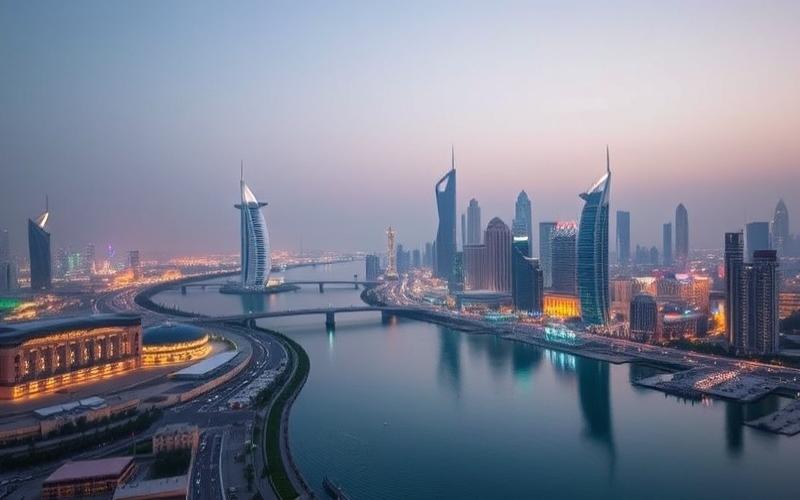

Dubai, the jewel of the United Arab Emirates, has established itself as a premier destination for real estate investors worldwide. [...]


Dubai, the jewel of the United Arab Emirates, has built a reputation as a premier destination for entrepreneurs worldwide. Its [...]
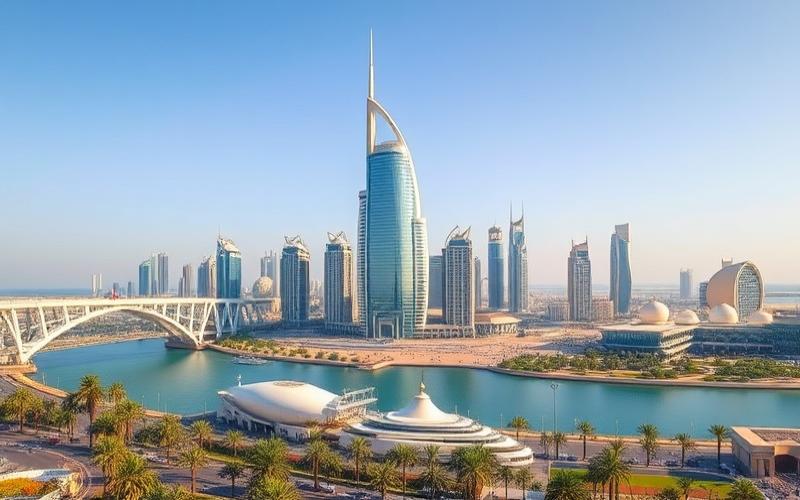

Dubai, the jewel of the United Arab Emirates, has become a top destination for entrepreneurs worldwide. With its attractive tax [...]
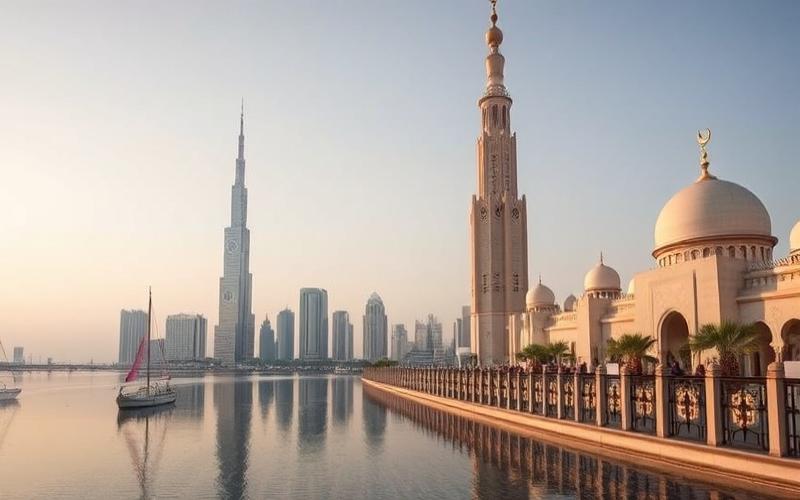

Dubai, the jewel of the United Arab Emirates, attracts thousands of expatriates each year seeking professional opportunities. For employers, this [...]


Dubai, the jewel of the United Arab Emirates, has established itself as a promised land for entrepreneurs worldwide. With its [...]
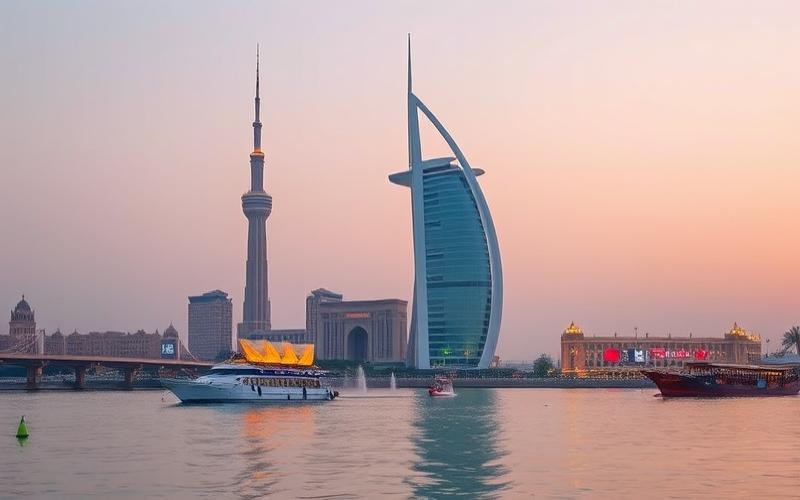

Dubai, the jewel of the United Arab Emirates, has become a premier destination for entrepreneurs worldwide. With its dynamic economy, [...]


Dubai, the jewel of the United Arab Emirates, is attracting an increasing number of entrepreneurs from around the world thanks [...]


Dubai, the jewel of the United Arab Emirates, has become a premier destination for entrepreneurs worldwide. With its dynamic economy, [...]


Understanding corporate culture in Dubai is essential for anyone looking to establish a presence or work in this dynamic metropolis [...]
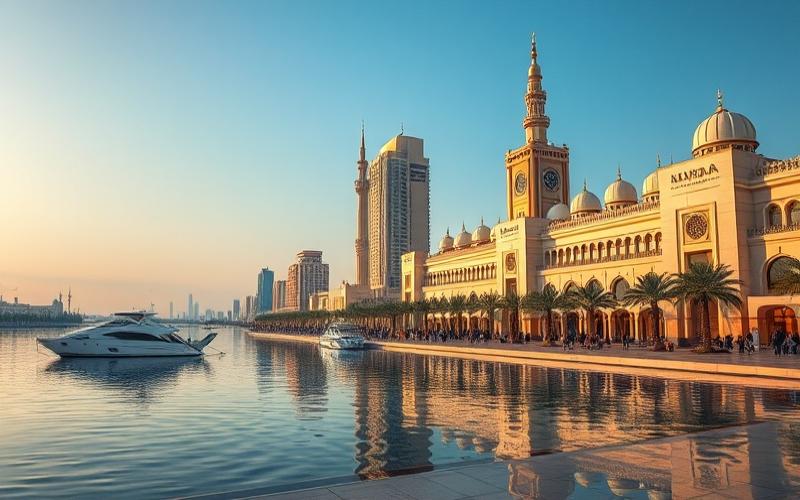

Dubai, the jewel of the United Arab Emirates, continues to shine as a beacon of opportunity for entrepreneurs worldwide. In [...]


Dubai, the jewel of the United Arab Emirates, is attracting an increasing number of entrepreneurs from around the world thanks [...]
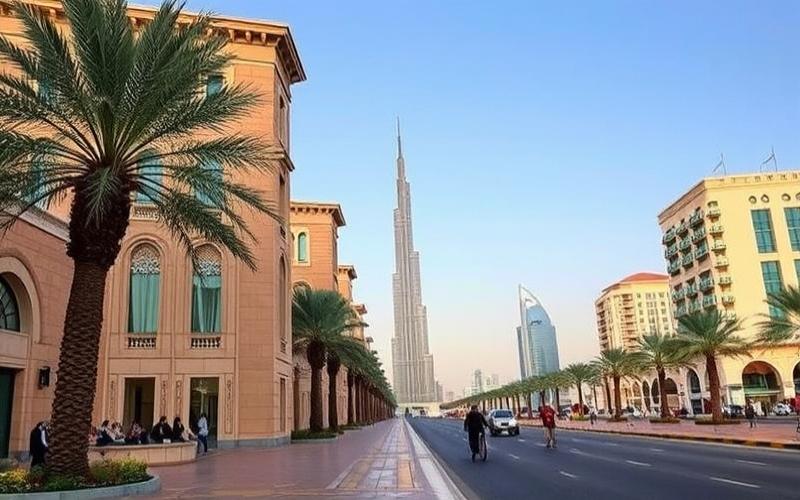

Dubai’s e-commerce sector is experiencing explosive growth, fundamentally transforming the commercial landscape of this dynamic metropolis. With a young, tech-savvy [...]


Dubai has established itself as one of the most attractive destinations in the world for launching a startup. This city-state [...]
Why Dubai is an Entrepreneur’s Paradise
Dubai isn’t just a city of impressive skyscrapers and luxurious shopping malls. It’s primarily a global economic hub that attracts entrepreneurs like a magnet. Here’s why:
Advantageous Tax Environment One of Dubai’s main assets lies in its attractive taxation. The city offers a corporate tax rate of only 9% for profits exceeding 375,000 AED, and 0% below this threshold. Furthermore, there’s no personal income tax, allowing entrepreneurs to maximize their profits and reinvest in their business.
A Diversified and Growing Economy Contrary to popular belief, Dubai’s economy doesn’t rely solely on oil. The city has successfully diversified its activities, focusing on sectors such as tourism, finance, technology, and international trade. This diversification offers numerous opportunities for entrepreneurs in various fields.
World-Class Infrastructure Dubai boasts state-of-the-art infrastructure, including an efficient transportation network, specialized free zones, and advanced technology parks. These facilities greatly facilitate business creation and development, offering an environment conducive to innovation and growth.
- Dubai International Airport: one of the busiest in the world
- Jebel Ali Port: the world’s largest artificial port
- Dubai Internet City: technology hub attracting tech giants
Good to Know:
Dubai offers a unique blend of tax advantages, modern infrastructure, and growth opportunities, making the city a preferred choice for entrepreneurs worldwide.
Available Legal Structures: Make the Right Choice
When it comes to setting up a business in Dubai, several options are available to you. Each legal structure has its own advantages and suits different types of activities. Here are the main structures to consider:
1. Limited Liability Company (LLC) The LLC is one of the most popular legal forms in Dubai. It offers considerable flexibility and suits a wide range of commercial activities. Since 2021, foreigners can own 100% of shares in an LLC in most sectors, representing a major change from the previous regulation that required a local partner holding 51% of shares.
2. Free Zone Company (FZC or FZCO) Dubai’s free zones offer specific benefits, including total tax exemption for a determined period and the possibility to repatriate 100% of profits. Each free zone specializes in a particular sector, such as technology, media, or logistics.
3. Branch of a Foreign Company This option allows a foreign company to establish a presence in Dubai without creating a separate legal entity. It’s an ideal solution for businesses wanting to test the market before fully committing.
4. Offshore Company Although limited in its activities within Dubai itself, an offshore company can be an excellent choice for entrepreneurs seeking to optimize their international taxation or manage global investments.
- LLC: ideal for general commercial activities
- FZC/FZCO: perfect for export-oriented or specialized businesses
- Branch: suitable for multinational companies wanting to establish in Dubai
- Offshore: optimal for managing international assets
Good to Know:
The choice of legal structure depends on your business objectives, budget, and long-term strategy. It’s crucial to properly evaluate each option before making a decision.
Corporate Taxation in Dubai: A Major Advantage
One of Dubai’s main attractions for entrepreneurs worldwide lies in its advantageous tax regime. Understanding the nuances of corporate taxation in Dubai is essential to maximize the benefits of your establishment in the emirate.
Competitive Corporate Tax Since June 2023, Dubai introduced corporate tax with a standard rate of 9% for profits exceeding 375,000 AED (approximately $102,000). However, profits below this threshold remain untaxed, which is particularly advantageous for small and medium-sized businesses in the startup phase.
- Companies operating in free zones can benefit from total corporate tax exemption for a period of up to 50 years, renewable.
- Natural resource extraction activities are subject to a separate tax regime.
- Companies engaged in certain public interest activities may also benefit from exemptions.
No Personal Income Tax Another major advantage is the absence of personal income tax. This means entrepreneurs and their employees can keep their entire salary, which constitutes a considerable attraction for attracting international talent.
VAT and Other Taxes Dubai applies a 5% VAT, one of the lowest rates in the world. Certain sectors, such as education and healthcare, benefit from VAT exemption. There are also no capital gains taxes or inheritance taxes.
Good to Know:
Although Dubai’s tax regime is generally very advantageous, it’s important to note that regulations are evolving. It’s recommended to consult a tax expert to optimize your tax strategy according to your specific situation.
Setting Up Your Company in Dubai: A Simplified Process
Setting up a company in Dubai may seem intimidating at first, but the process is actually relatively simple and fast, especially if you’re well prepared. Here are the key steps to follow:
1. Define Your Activity and Choose Your Legal Structure Start by precisely determining the activity you wish to pursue. This will help you choose the most suitable legal structure (LLC, FZC, offshore, etc.) and identify the necessary licenses.
2. Choose and Reserve a Trade Name Your company name must be unique and comply with UAE naming rules. You can check name availability and reserve it with Dubai’s Department of Economic Development (DED).
3. Obtain Initial Approvals Submit an initial approval application to the DED or the relevant free zone authority. This step typically involves providing a business plan and identification documents.
4. Rent Office Space For most types of businesses, you’ll need to have a physical address in Dubai. This can range from a virtual office to full commercial premises, depending on your needs and the type of license.
5. Obtain the Business License Once all approvals are obtained and necessary documents gathered, you can apply for your business license. The processing time typically ranges from a few days to a few weeks.
6. Register with Relevant Authorities Depending on your activity, you may need to register with other authorities, such as the Dubai Chamber of Commerce and Industry or the Federal Tax Authority for VAT.
- Prepare all your documents in advance to speed up the process
- Consider getting help from a local consultant to navigate administrative procedures
- Budget for license fees, visa costs, and office rental expenses
Good to Know:
The business setup process in Dubai can be completed in as little as 1 to 2 weeks for some simple structures, but it’s prudent to allow 1 to 2 months to account for potential delays or complications.
Dubai vs Other Offshore Jurisdictions: An Enlightening Comparison
Dubai positions itself as an attractive alternative to traditional offshore jurisdictions. Here’s how it compares to other popular destinations for international company formation:
Dubai vs Cayman Islands While the Cayman Islands are renowned for their banking confidentiality, Dubai offers a better balance between discretion and transparency. Furthermore, Dubai has a more diversified economy and more developed infrastructure, offering real growth opportunities beyond mere tax optimization.
Dubai vs Singapore Singapore and Dubai share many similarities as international commercial hubs. However, Dubai stands out with its strategic geographical position between East and West, as well as its even more advantageous tax regime, particularly the absence of personal income tax.
Dubai vs Hong Kong Although Hong Kong has long been the preferred gateway to the Chinese market, recent political uncertainties have strengthened Dubai’s appeal. The emirate offers superior political and economic stability, as well as easier access to Middle Eastern and African markets.
- Political and economic stability
- World-class infrastructure
- Highly advantageous tax regime
- Ease of doing business
- High quality of life for expatriates
Good to Know:
Although Dubai offers many advantages, the choice of jurisdiction ultimately depends on your specific objectives, target market, and overall strategy. Thorough analysis is recommended before making a decision.
Social Obligations in Dubai: A Framework Favorable to Employers
Understanding social obligations in Dubai is crucial for any entrepreneur wishing to establish their business there. The emirate’s social system is designed to be favorable to employers while offering adequate protection to employees.
Social Security System Unlike many Western countries, Dubai doesn’t have an extensive social security system for expatriates. Employers are required to provide health insurance to their employees, but there are no mandatory social contributions for pensions or unemployment for expatriates.
End of Service Benefits Employers are required to pay an end of service gratuity to employees who leave the company after at least one year of service. This benefit is calculated based on basic salary and length of service.
- Employees are entitled to a minimum of 30 days paid leave per year
- The standard work week is 48 hours, with one mandatory rest day
- Overtime must be paid at a higher rate
Employee Protection Dubai’s labor law offers protection against wrongful termination and guarantees certain fundamental rights to employees. However, unions and collective bargaining are not permitted.
Emiratisation Companies operating in certain sectors are required to employ a certain percentage of Emirati citizens. This policy, known as Emiratisation, aims to promote the employment of nationals in the private sector.
Good to Know:
Although social obligations in Dubai are generally less burdensome than in many Western countries, it’s crucial to strictly respect local labor laws to avoid any disputes or penalties.
Opening a Corporate Bank Account in Dubai: Keys to Success
Opening a corporate bank account is a crucial step in the process of setting up your company in Dubai. Here’s how to effectively navigate this process:
Choosing the Right Bank Dubai has numerous local and international banks. Look for a bank that offers services tailored to your business type and specific needs. Popular banks for businesses include Emirates NBD, HSBC, and RAKBank.
- Business license
- Company incorporation documents
- Passports and visas of directors and shareholders
- Detailed business plan
- Proof of source of funds
Opening Process 1. Schedule an appointment with the business relationship manager of your chosen bank. 2. Submit all required documents during your appointment. 3. The bank will conduct a thorough due diligence check of your business and its owners. 4. Once approved, sign the account opening documents and make the initial deposit.
Timelines and Minimum Deposit The process can take from 2 to 8 weeks, depending on the bank and the complexity of your business structure. The minimum deposit varies considerably, ranging from 10,000 AED to 500,000 AED or more for some premium accounts.
Tips to Facilitate the Process – Ensure all your documents are up to date and properly legalized. – Prepare a detailed and convincing business plan. – Be transparent about your source of funds and the nature of your activities. – Consider using a bank introduction service to facilitate the process.
Good to Know:
Banks in Dubai have become stricter in their verification procedures in recent years. Meticulous preparation and total transparency are essential for successfully opening your corporate bank account.
Future Sectors in Dubai: Where to Invest for Success
Dubai, known for its futuristic vision and dynamic economy, offers numerous opportunities in various and innovative sectors. Here’s an overview of the most promising areas for entrepreneurs:
- Artificial intelligence and robotics
- Blockchain and cryptocurrencies
- Internet of Things (IoT)
- Virtual and augmented reality
Renewable Energy and Green Technologies With the Dubai Clean Energy Strategy 2050 initiative, the emirate aims to become a global leader in clean energy. Opportunities abound in: – Solar and wind energy – Energy storage technologies – Sustainable water management
E-commerce and Logistics The e-commerce sector is experiencing exponential growth in Dubai, supported by cutting-edge logistics infrastructure. Promising areas include: – Online commerce platforms – Innovative payment solutions – Next-generation delivery and logistics services
Tourism and Hospitality Despite its maturity, this sector continues to innovate: – Medical and wellness tourism – Virtual reality-based tourist experiences – Luxury hospitality and eco-resorts
Financial Services and FinTech Dubai positions itself as a major financial hub, with growing interest in: – Digital banking services – Mobile payment solutions – Online investment platforms
Good to Know:
Dubai actively encourages innovation in these sectors through government initiatives, incubators, and specialized free zones. Aligning with these priority sectors can offer additional benefits in terms of support and incentives.
Recruiting in Dubai: Building a High-Performing Team
Recruiting in Dubai presents unique opportunities but also specific challenges. Here’s how to effectively navigate the emirate’s job market to build a high-level team:
A Pool of International Talent Dubai attracts qualified professionals from around the world, offering a diverse and multilingual talent pool. This diversity can be a major asset for companies aiming for international expansion.
- Use popular online recruitment platforms like LinkedIn, Bayt.com, and Gulf Talent
- Participate in frequent job fairs in Dubai
- Collaborate with specialized recruitment agencies
- Leverage professional networks and referrals
Understanding Salary Expectations Salaries in Dubai are generally high and often tax-free, attracting many talents. However, the high cost of living must be considered in compensation packages.
Visa and Work Permit Process As an employer, you’ll be responsible for obtaining work visas for your expatriate employees. The process involves: 1. Obtaining an employment offer approved by the Ministry of Human Resources 2. Applying for a work permit 3. Arranging a medical examination for the employee 4. Finalizing the residence visa
Emiratisation Policy Certain sectors are subject to employment quotas for Emirati citizens. Ensure you understand and respect these requirements during your recruitment planning.
Corporate Culture and Talent Retention In a dynamic job market like Dubai’s, talent retention is crucial. Invest in: – Professional development programs – Competitive benefits (health insurance, housing allowances, etc.) – An inclusive corporate culture that values diversity
Good to Know:
The job market in Dubai is highly competitive. Offering an attractive package, beyond just salary, and creating a positive work environment are essential for attracting and retaining the best talent.
In conclusion, setting up a company in Dubai offers exceptional opportunities for ambitious entrepreneurs. With its advantageous tax environment, world-class infrastructure, and dynamic economy, Dubai positions itself as an essential business hub. Whether you’re in tech, finance, or any other innovative sector, the emirate offers fertile ground for growth and international expansion.
However, navigating Dubai’s entrepreneurial landscape requires a thorough understanding of local regulations, administrative procedures, and cultural nuances. This is where a professional’s expertise can make all the difference.
Disclaimer: The information provided on this website is for informational purposes only and does not constitute financial, legal, or professional advice. We encourage you to consult qualified experts before making any investment, real estate, or expatriation decisions. Although we strive to maintain up-to-date and accurate information, we do not guarantee the completeness, accuracy, or timeliness of the proposed content. As investment and expatriation involve risks, we disclaim any liability for potential losses or damages arising from the use of this site. Your use of this site confirms your acceptance of these terms and your understanding of the associated risks.



